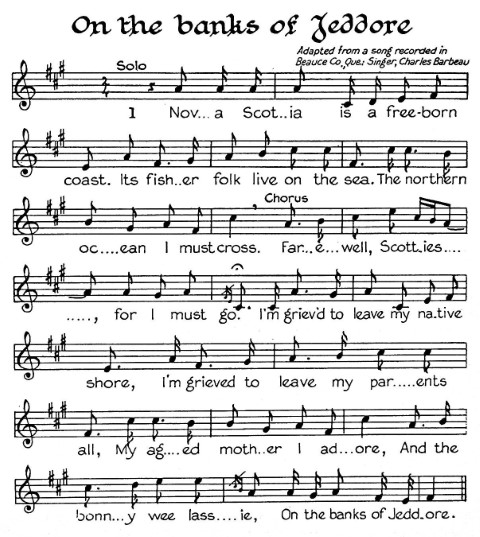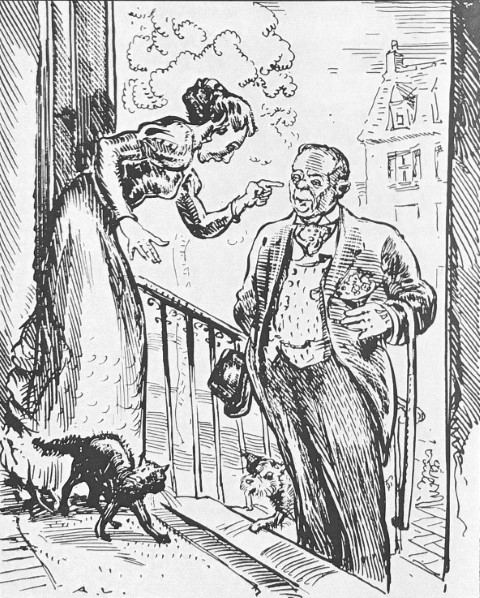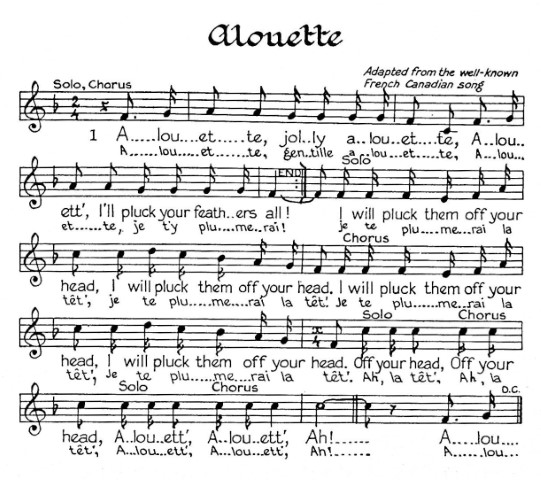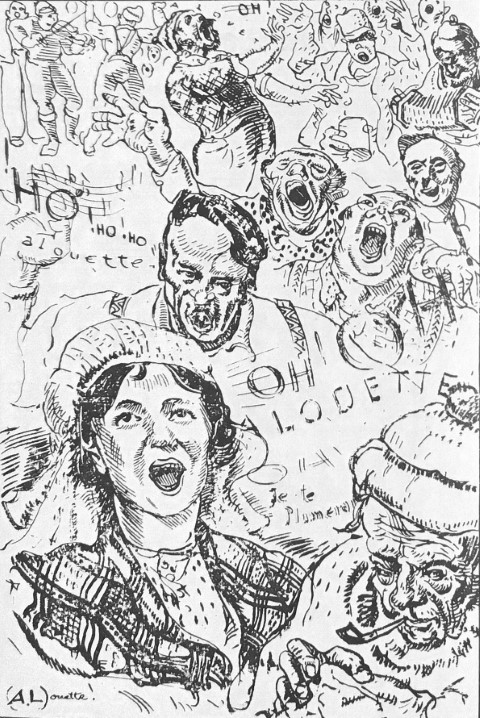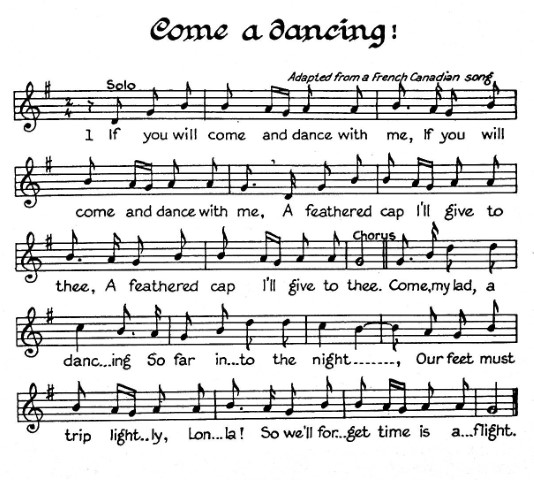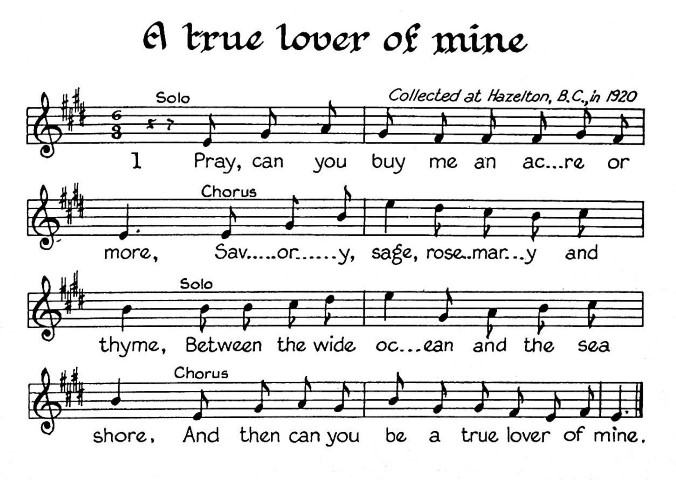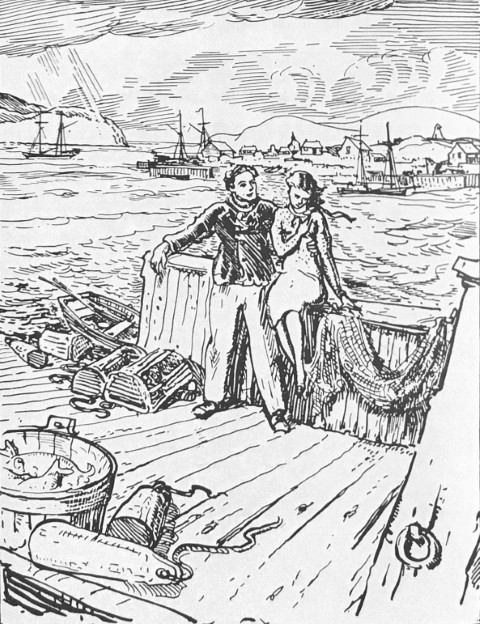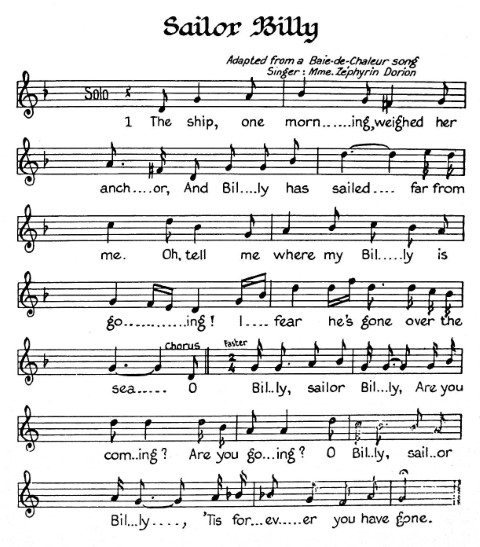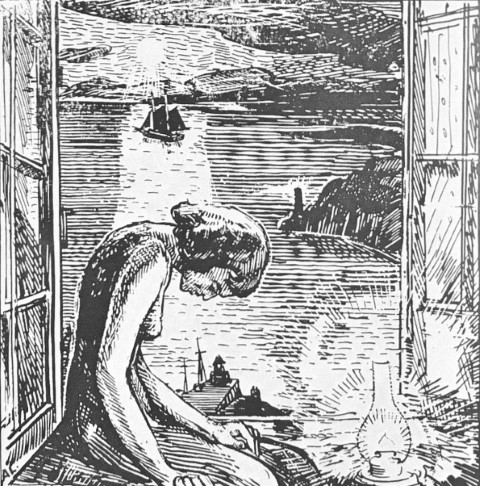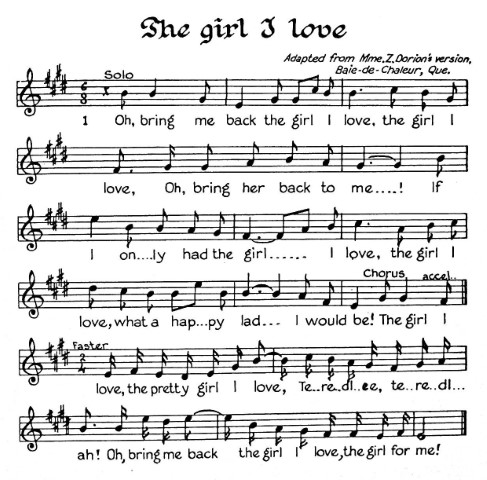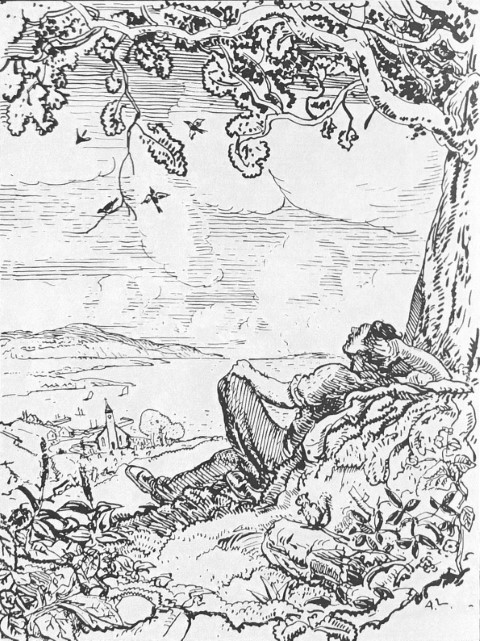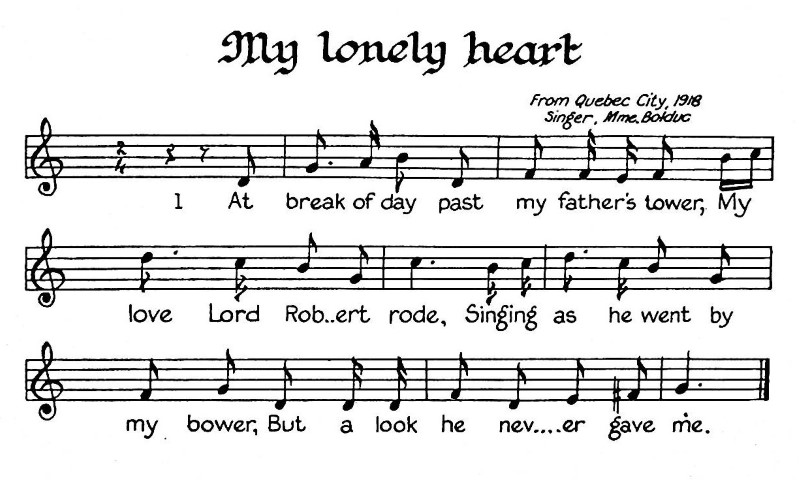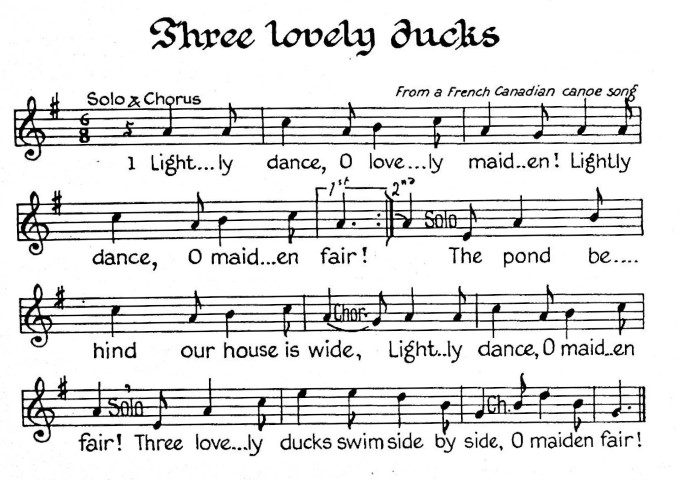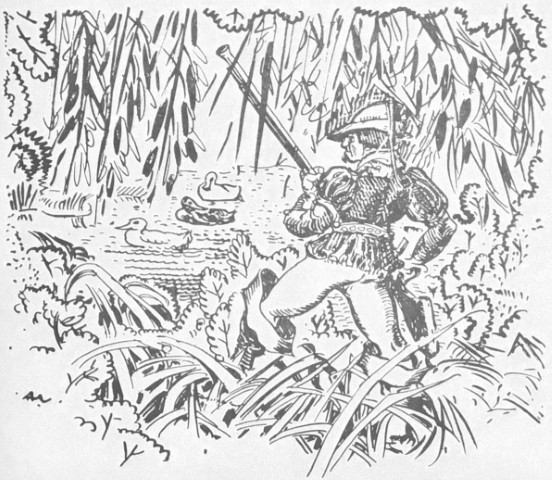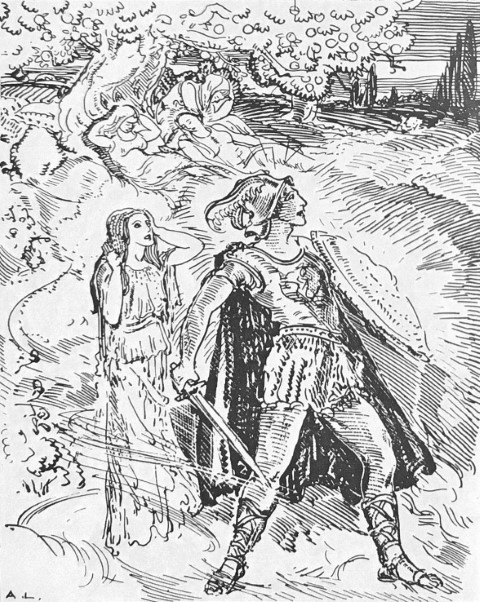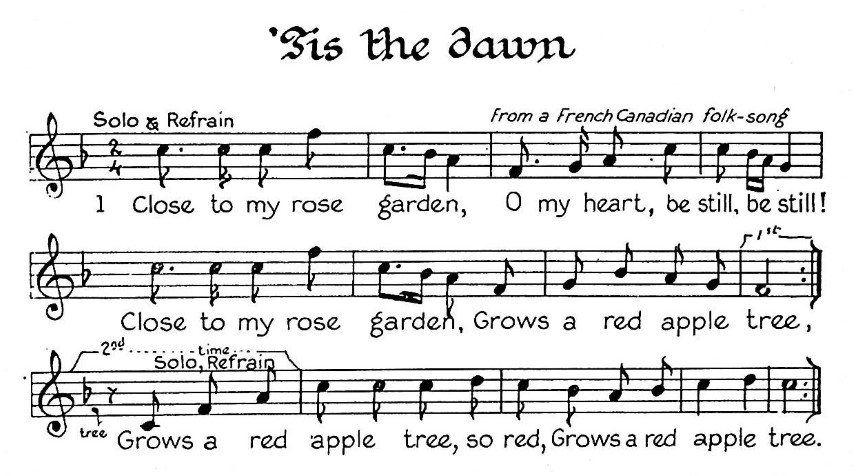* A Distributed Proofreaders Canada eBook *
This eBook is made available at no cost and with very few
restrictions. These restrictions apply only if (1) you make
a change in the eBook (other than alteration for different
display devices), or (2) you are making commercial use of
the eBook. If either of these conditions applies, please
contact a https://www.fadedpage.com administrator before proceeding.
Thousands more FREE eBooks are available at https://www.fadedpage.com.
This work is in the Canadian public domain, but may be under
copyright in some countries. If you live outside Canada, check your
country's copyright laws. IF THE BOOK IS UNDER COPYRIGHT
IN YOUR COUNTRY, DO NOT DOWNLOAD OR REDISTRIBUTE THIS FILE.
Title: Come a Singing!
Date of first publication: 1947
Author: Marius Barbeau (1883-1969) and Arthur Bourinot (1873-1969)
Illustrator: Arthur Lismer (1885-1969)
Date first posted: Nov. 18, 2023
Date last updated: Nov. 18, 2023
Faded Page eBook #20231126
This eBook was produced by: John Routh
& the online Distributed Proofreaders Canada team at https://www.pgdpcanada.net
CROWN COPYRIGHT
RESERVED 1973
PREFACE
The songs of this booklet are drawn from the repertory of Canadian
folk-songs now preserved at the National Museum or, as indicated at the
head of each song, from the published collections of Professor W. Roy
Mackenzie, of Washington University, St. Louis, Missouri, and of Miss
Helen Creighton, former Dean of Women at the University of King’s College,
Halifax. Five of the songs have been adapted from Miss Creighton’s
Songs and Ballads from Nova Scotia (J. M. Dent & Sons, 1932), and
four from Dr. Mackenzie’s Ballads and Sea Songs from Nova Scotia
(Harvard University Press, 1928).
These songs are for practical use; their words and tunes as far as
possible must be rhythmical and appealing. It was not advisable, therefore,
to reproduce the sources exactly, as we usually find them in a run
down condition because of prolonged oral transmission.
In the task of revamping the texts, I enjoyed the collaboration of
Mr. Arthur Bourinot, who adapted several French-Canadian songs from
the original, and of Mr. Douglas Leechman.
Grateful acknowledgment is due to the National Museum of Canada,
which has facilitated this work, to Mr. Arthur Lismer, who has prepared
the illustrations and the cover, to Professor Mackenzie and Miss Creighton
for their kind permission to use their songs, and to Mr. Joseph-Ovila Fortin,
of the Geological Survey, Canada, who has done the lettering.
MARIUS BARBEAU
| 2 | My sailing ship is waiting on the waves. |
| The signal beckons me away, |
| And bids me part with you my love. |
| | Farewell, lassie, for I must go . . . |
| | I’m griev’d to leave . . . |
| | |
| 3 | The waning sun has set in the west. |
| The whipporwill sings on the hill. |
| A bold sea rover must not rest. |
| | Farewell, darling, for I must go . . . |
| | |
| 4 | The lonely cries of the gulls aloft |
| Drift on the wind that fills the sails. |
| Away I’m sailing on the sea. |
| | Farewell, ye all, for I’m gone . . . |
| | |
| 5 | Bright is the light of the summer moon, |
| It steals through the curtain of night, |
| As I am dreaming of my home. |
| | Farewell, my land, for I must go . . . |

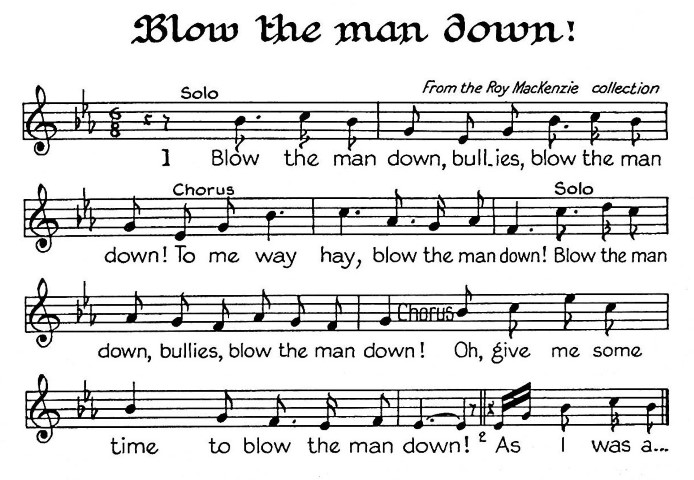
| 2 | As I was a walking down Barrington Street, |
| | To me way, hay, blow the man down! |
| A nice little damsel I chanced to meet. |
| | Oh, Give me . . . |
| | |
| 3 | The Old Man’s very much worried for her . . . |
| Tell him to worry no more, O my sir . . . |
| | |
| 4 | We all got full, last night. Aboard we came . . . |
| I told her, I’d never do that again . . . |
| | |
| 5 | This same Old Man, he’s a sad sober chap . . . |
| Says he, “Come have a drink, stay for a nap . . .” |
| | |
| 6 | He drew a bottle to pour us a drink . . . |
| Wasn’t that kind of him, what do you think? . . . |
| | |
| 7 | We’re off to Berlin, The Jerries will get . . . |
| From him a lesson they’ll never forget . . . |
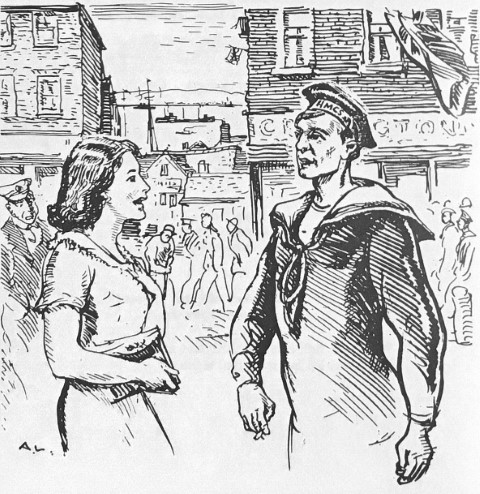
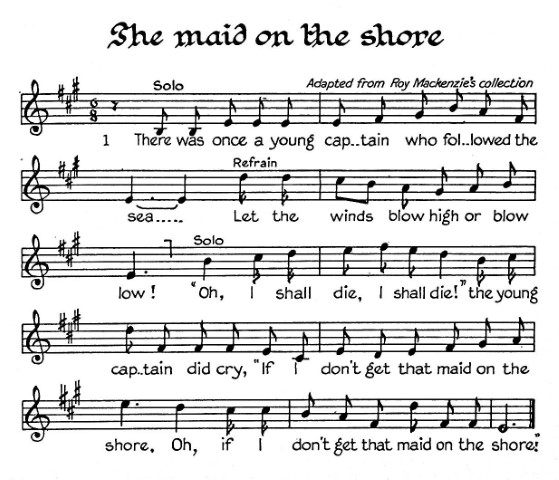
| 2 | The young captain had jewels and a purse of gold. |
| | Let the winds blow high or blow low! |
| And all his gold he would gladly give to this fair maid |
| If she would take a sail out to sea, |
| Oh, if she would take a sail out to sea. |
| | |
| 3 | So by subtle persuasions he led her aboard. |
| | Let the winds blow high or blow low! |
| Then haunting tunes she did sing, and she sang them so long |
| That she soothed the bold sailors to sleep, |
| Oh yes! she soothed the bold sailors to sleep. |
| | |
| 4 | All his jewels she took and his purse full of gold. |
| | Let the winds blow high or blow low! |
| Bravely she took his broadsword to make herself an oar, |
| And she paddled away from the ship, |
| Oh yes! she paddled away from the ship. |
| | |
| 5 | “Oh, were my men so mad, Oh, were my men so drunk! |
| | Let the winds blow high or blow low! |
| Why did they let her go free with her beauty so fair? |
| On the beach now she sits all alone, |
| Oh, on the beach now she sits all alone.” |
| | |
| 6 | “Your men were not so mad, your men were not so drunk. |
| | Let the winds blow high or blow low! |
| When you were all fast asleep, I left you on the deck. |
| I’m a maiden again on the shore, |
| Oh, I’m a maiden again on the shore.” |
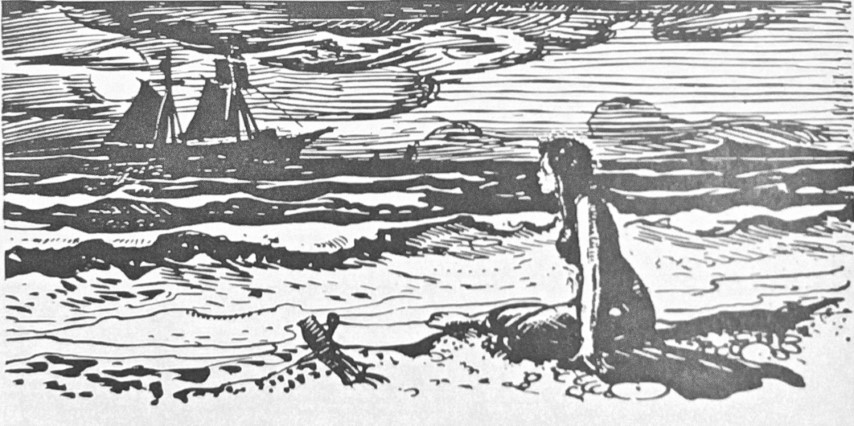

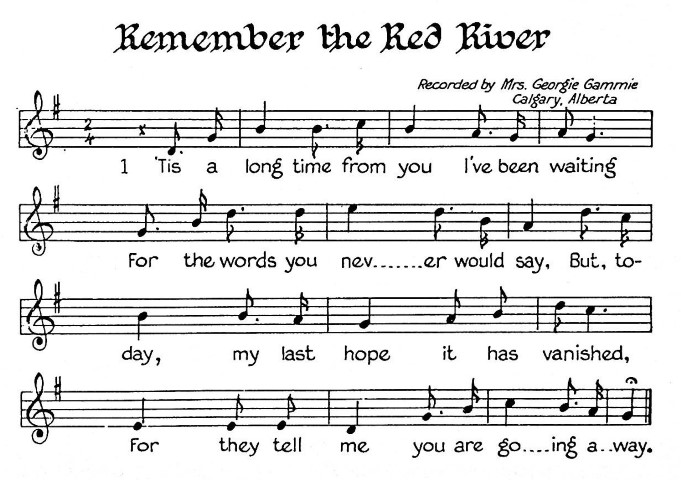
| 2 | From our plains I knew that you’d be going. |
| I shall miss your bright eyes, your smile. |
| Far from me you are taking the sunshine |
| That has made lovely my path for a while. |
| |
| 3 | Often think of the Red River Valley. |
| Very sad and lonely I’ll be. |
| Do remember the heart you are breaking. |
| Promise you will remain faithful to me. |
| |
| 4 | When you sail far across the wide ocean, |
| May you treasure those bright hours |
| That we spent on the bank of the River, |
| In summer evenings ’mong prairie flowers! |
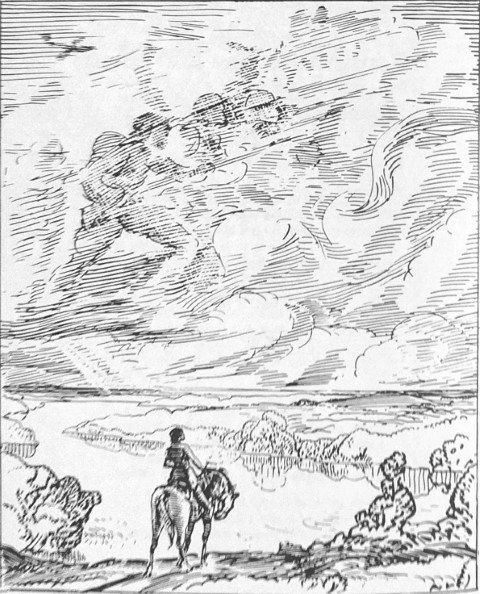
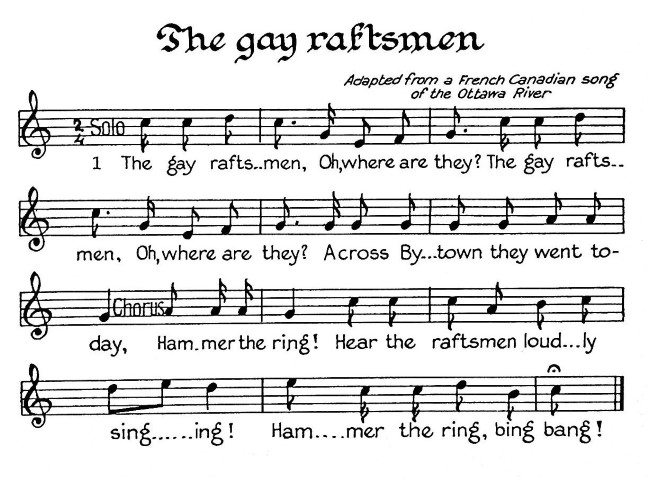
| 2 | Across By-Town, they went, today |
| To lumber camps, they’re on their way. |
| |
| 3 | They’ve packed their grub, they cannot stay, |
| |
| 4 | They climb the Ottawa, the livelong day, |
| |
| 5 | In bark canoes, all weathered grey. |
| |
| 6 | The lumber camp they’ve reached, hurray! |
| |
| 7 | Their axes trim, there’s no delay. |
| |
| 8 | They’re striking hard; the tall trees sway. |
| |
| 9 | To give them strength for work and play, |
| |
| 10 | “Eat pork and beans!” they always say; |
| |
| 11 | Then sit and smoke their pipes of clay. |
| |
| 12 | The shanties close; sing tour-a-lai. |
| |
| 13 | The log drive starts, the same old way. |
| |
| 14 | Big logs they square and drag away |
| |
| 15 | To build the rafts, on them to stay, |
| |
| 16 | And float down stream, a great array. |
| |
| 17 | The Aylmer portage tramp so gay. |
| |
| 18 | Their pockets jingle with their pay. |
| |
| 19 | They’re bound to call chez Mère Gauthier, |
| |
| 20 | With buxom girls to frisk and play, |
| |
| 21 | Drink whiskey blanc, stretch on the hay. |
| |
| 22 | Their money gone, they swear away, |
| |
| 23 | A doctor call, ah welladay! |
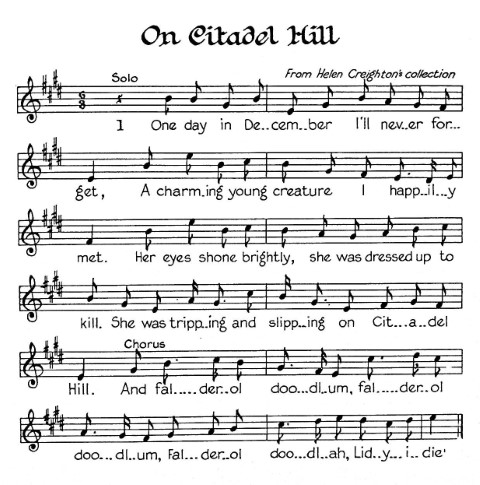
| 2 | I says, “My fair creature, please me excuse!” |
| To accept my arm she did not refuse. |
| Her arm locked in mine, I sure felt love’s thrill, |
| As we walked off together on Citadel Hill . . . |
| |
| 3 | The very next day, to the church we did go. |
| The people all whispered, as well you may know. |
| The priest said, “Will you wed?” Says I, “That we will!” |
| So we kissed and were hitched on Citadel Hill . . . |
| |
| 4 | Now we are married, and of children have three. |
| Me and the Missus can never agree. |
| She called one Bridget, the other one Bill, |
| Says I, “The runt’s name shall be Citadel Hill” . . . |
| |
| 5 | Come, all you young fellows, take warning from me! |
| If ever in need of a wife you may be, |
| I’ll tell you the place you’ll get more than your fill. |
| Just try tripping and slipping on Citadel Hill . . . |
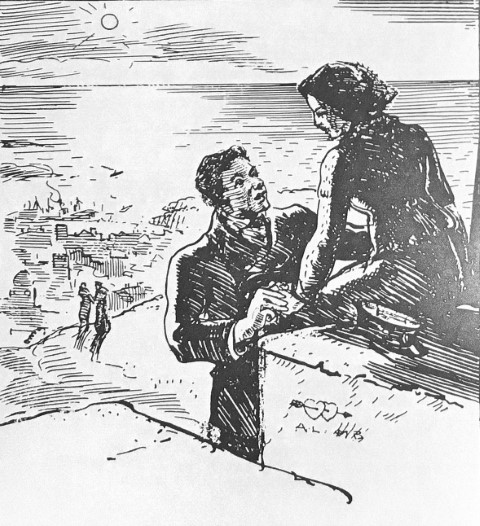
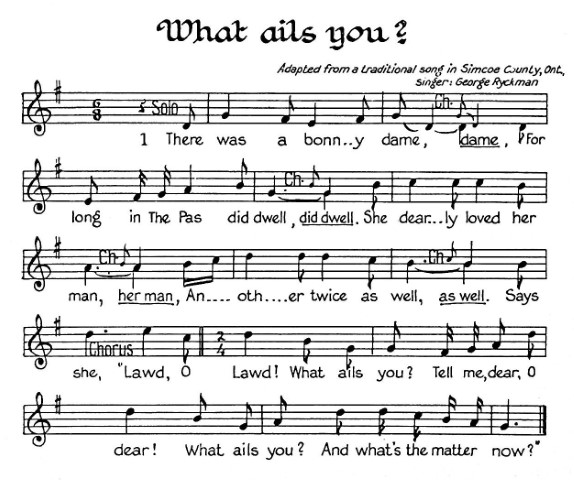
| 2 | Says he, “Myself I’d drown |
| If but I found a way.” |
| Says she, “With you I’d drown, |
| For fear you’d go astray.” |
| |
| 3 | To town straightway she flew |
| To look and try to find |
| A drug or other brew |
| To make her old man blind. |
| |
| 4 | She to the river went, |
| And tried to push him in. |
| He stepped aside and sent |
| The dear old girl right in. |
| |
| 5 | She bawled in deadly fear, |
| As loud as she could bawl. |
| Says he, “What’s that, my dear? |
| I cannot see at all.” |
| |
| 6 | He would not take a chance, |
| For fear that she could swim. |
| But took a good long branch |
| And pushed her farther in. |
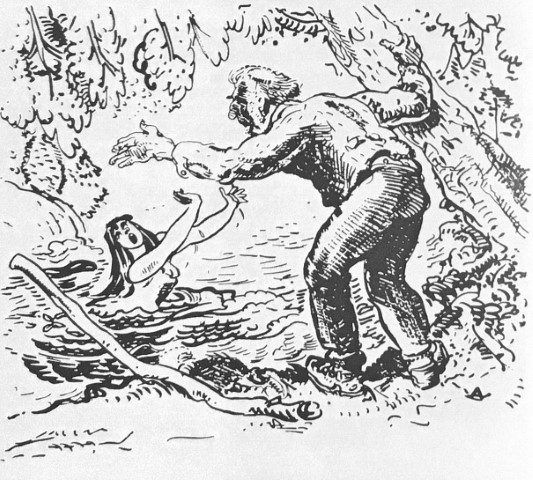
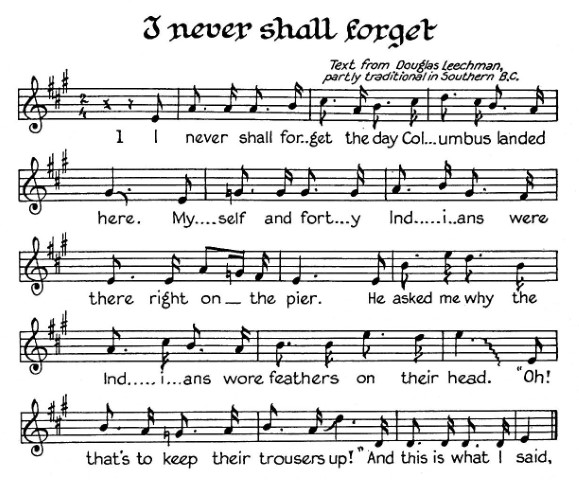
| (Chorus:) |
| | |
| ’Twas I who built the Rockies up |
| | And placed them where they are, |
| Sold whiskey to the Indians, |
| | Behind my little bar, |
| ’Twas I that made Niagara Falls, |
| | And first discovered beer. |
| Oh! that was long before Columbus |
| | Landed over here. |
| | |
| 2 | Columbus asked me where to go |
| | To catch the China train, |
| I saw the poor old boy had got |
| | The itching foot again. |
| Says I, “Too bad! There is no train |
| | That leaves for there today. |
| You’ll find a Chinese laundryman |
| | Not half a block away.” |
| | |
| (Chorus:) |
| | |
| 3 | He saw that some of my Red Men |
| | Had skins that were quite fair, |
| And thought some other white man must |
| | Have wandered over there. |
| Says I, “You have to bear in mind |
| | That I’ve been here some time. |
| They certainly can not be yours, |
| | But they, no doubt, are mine!” |
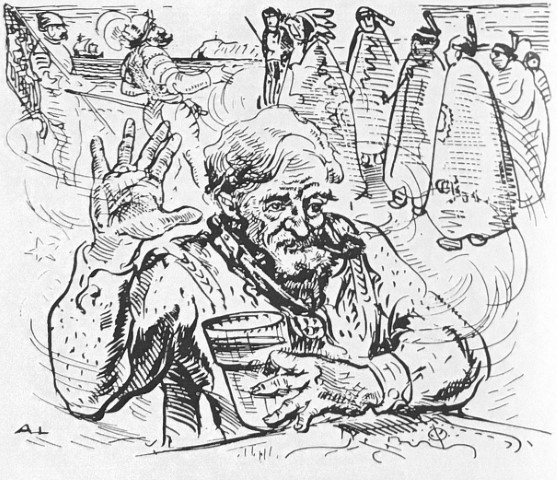
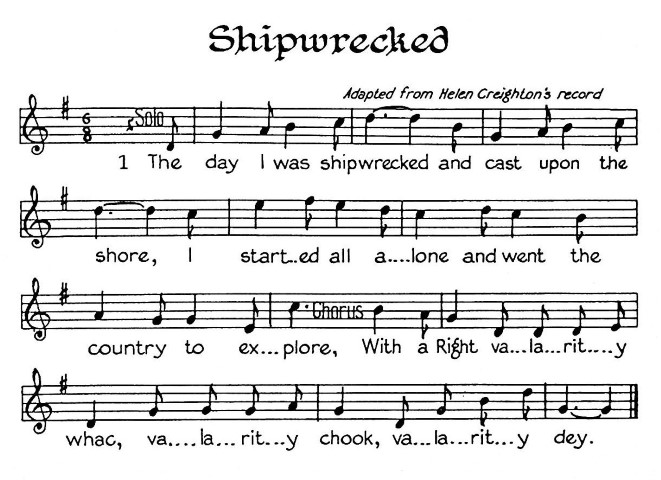
| 2 | Upon the sandy land, I saw a crocodile. |
| From the nose to the tail, it was more than thirty-two miles, |
| |
| 3 | This kind of crocodile was not the usual size. |
| I climbed up a dead tree to look into its glaring eyes . . . |
| |
| 4 | I bore away, one day, with ev’ry stitch of sail, |
| It took fully three days to reach from the head to the tail . . . |
| |
| 5 | The wind was blowing hard; t’was blowing from the south. |
| It blew me right across the beast into its gaping mouth . . . |
| |
| 6 | I roamed about the throat until I found a door. |
| Inside I saw bullocks and horses laid up by the score . . . |
| |
| 7 | The monster had long ribs and sure it had a hide. |
| It took me thirteen days to work a hole right through the side . . . |
| |
| 8 | Well now, you gentlemen, if you go up the Nile, |
| Somewhere you’ll find the shell of this wonderful crocodile . . . |
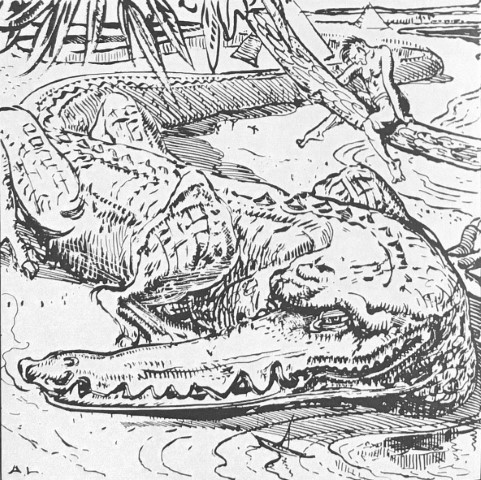
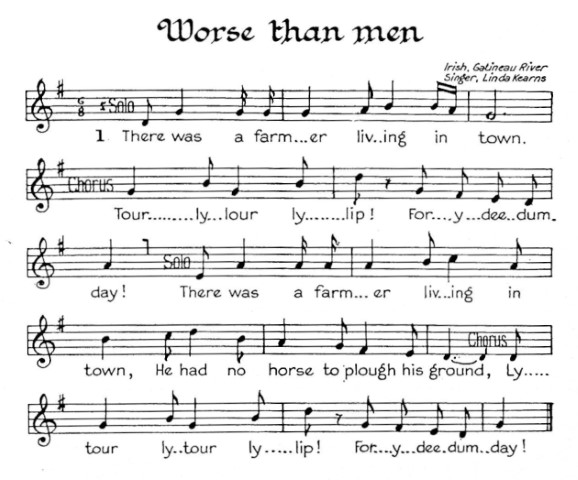
| 2 | He saddled a pig, an old black cow, . . . |
| Tore up the ground, the deuce knows how! . . . |
| |
| 3 | The devil he came to him one day, |
| And said, “One of yours must come away.” |
| |
| 4 | “Oh surely, it’s not my eldest son. |
| If ’tis, my God, I am undone.” |
| |
| 5 | “Oh no, it’s not your eldest son. |
| Your scolding wife, she has to come.” |
| |
| 6 | “Take her, yes, take her with all my heart. |
| I hope you devils ne’er will part.” |
| |
| 7 | He took the woman upon his back. |
| A pedlar strange, and strange his pack. |
| |
| 8 | And when he came to hell’s back door. |
| He threw his pack upon the floor. |
| |
| 9 | A devil came and clanked his chain. |
| She kicked him quick, knocked out his brain. |
| |
| 10 | Up came another, behind the wall, |
| And cried, “She’s out to kill us all!” |
| |
| 11 | The devil put her upon his back, |
| And back to earth carried his pack. |
| |
| 12 | Now women are much worse than men; |
| They go to hell, come back again. |
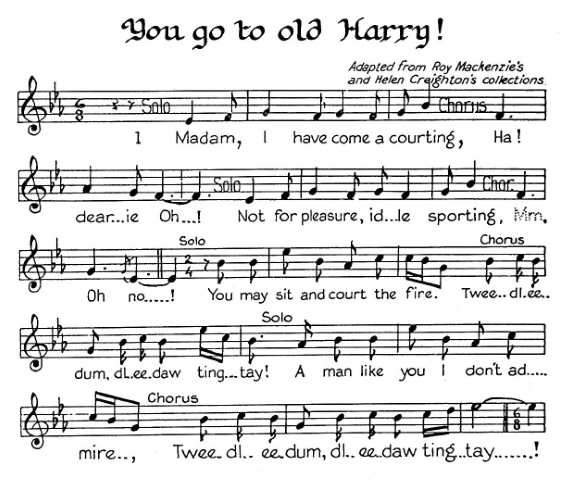
| 2 | “I’ve a ring and forty shillings. |
| | Ah! deary O! |
| You may have them if you’re willing. |
| | Mm, Oh yea!” |
| “I don’t want your siller money . . . |
| I want a man who calls me honey . . .” |
| | |
| 3 | “Madam, you are young and tender . . . |
| And your waist is small and slender . . . |
| “You know too well how to flatter, |
| I dislike such a silly patter . . .” |
| | |
| 4 | “I’ll go home and tell my father |
| That to marry you won’t bother . . .” |
| “You and father go to Harry! |
| Get you another girl to marry! . . .” |
| 2 | . . . I will pluck them off your beak, (bis) |
| | Off the beak, |
| | Off the head . . . |
| | |
| 3 | . . . I will pluck them off your eyes . . . |
| | |
| 4 | Etc.: neck, wings, back, feet, tail . . . |
| | |
| (In French: |
| . . . Je t’y plumerai la tête, (bis) |
| . . . le cou, . . . les ailes, . . . le dos, . . . les pattes, |
| . . . la queue . . .) |
| 2 | If you will come and dance with me, (bis) |
| A belt of gold I’ll give to thee. (bis) |
| |
| 3 | A homespun coat I’ll give to thee . . . |
| |
| 4 | A red kerchief I’ll give to thee . . . |
| |
| 5 | Two red slippers I’ll give to thee . . . |
| |
| 6 | A kiss or two I’ll give to thee . . . |
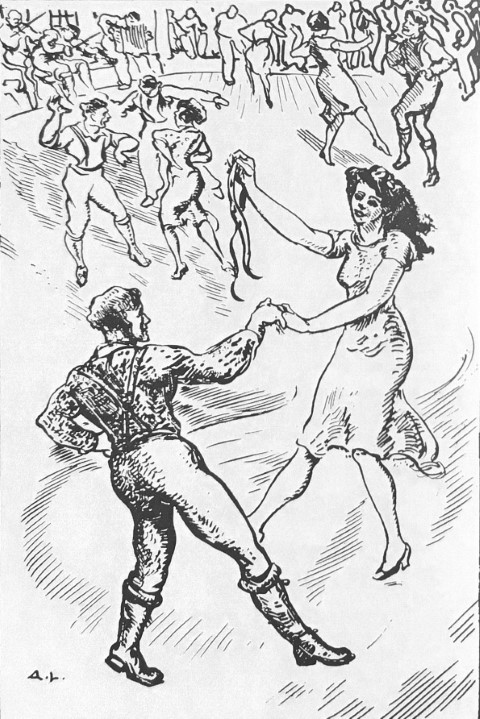

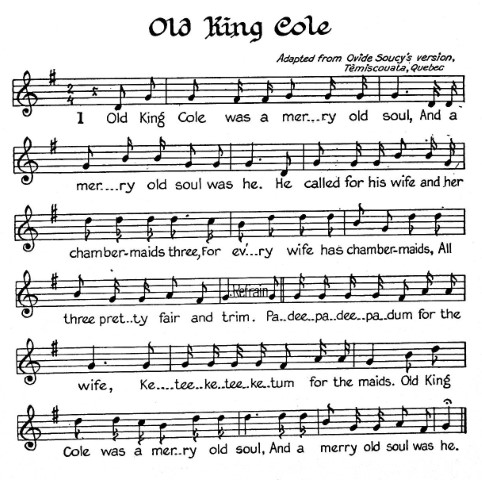
| 2 | Old King Cole was a merry old soul, |
| | And a merry old soul was he. |
| He called for his wife and his fiddlers three, |
| For ev’ry fiddler kin play well, for a very fine fiddle has he. |
| | Ee-tidle lidle lidle for the fiddle, |
| | Padee padee padum for the wife . . . |
| | Ketee ketee . . . (Etc.) |
| | |
| 3 | Old King Cole . . . |
| He called for his wife and his drummers three, |
| For ev’ry drummer kin play well, for a very fine drum has he. |
| | Ee-robedee bedum for the drum, |
| | Ee-tidle lidle lidle . . . |
| | |
| 4 | He called for his wife and his fifers three, |
| For ev’ry fifer kin play well, for a very fine fife has he. |
| | Ee-tulelu lelum for the fife . . . |
| | |
| 5 | He called for his wife and his harpers three, |
| For ev’ry harper kin play well, for a very fine harp has he, |
| | Ee-clame clame clame far the harp . . . |
| | |
| 6 | He called for his wife and his preachers three, |
| For ev’ry preacher kin preach well, for a very fine sermon has he. |
| | “God bless your soul!” for the preacher, |
| | Ee-clame clame . . . |
| | |
| 7 | He called for his wife and his sailors three, |
| For ev’ry sailor can curse well, for a very hot temper has he. |
| | “De’il take your soul!” for the sailor, |
| | “God bless your soul!” for the preacher . . . |
| | |
| 8 | . . . His farmers three |
| For ev’ry farmer kin plough well, for a very fine team has he. |
| | “Horse bucke dam!” for the farmer . . . |
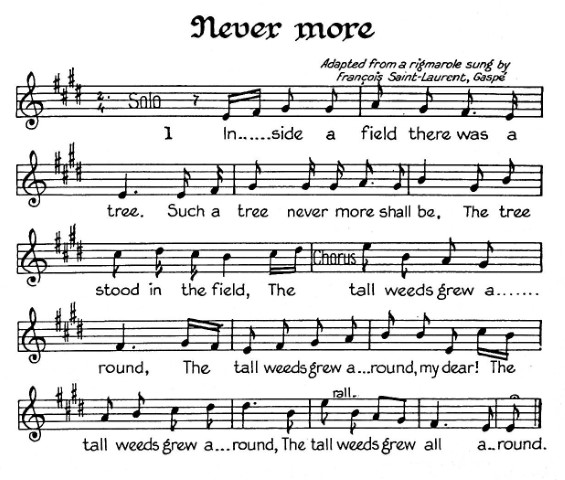
| 2 | Upon the tree there was a branch. |
| Such a branch never more shall be. |
| | | |
| | The branch was on the tree, |
| | The tree stood in a field, |
| | The tall weeds grew around, |
| | | My dear! . . . |
| | | |
| 3 | Upon the branch there was a limb. |
| Such a limb never more shall be. |
| | | |
| | The limb was in the branch, |
| | The branch was on the tree, |
| | The tall grass grew around . . .[1] |
| | | |
| 4 | Upon the limb there was a twig. |
| Such a twig never more shall be. |
| | | |
| | The twig was on the limb, |
| | The limb was on the branch, |
| | The branch was on the tree . . .[2] |
| | | |
| 5 | Upon the twig there was a leaf. |
| Such a leaf never more shall be. |
| | The leaf was on the twig . . . |
| | | |
| 6 | Set on the leaf there was a nest. |
| Such a nest never more shall be. |
| | The nest under the leaf . . . |
| | | |
| 7 | Inside the nest there was an egg. |
| Such an egg never more shall be. |
| | The egg was in the nest . . . |
| | | |
| 8 | Inside the egg there was a bird, |
| Such a bird never more shall be. |
| | The bird was in the egg . . . |
| | | |
| 9 | Inside the bird there was a song. |
| Such a song never more shall be. |
| | The song was in the bird . . . |
| | | |
| 10 | Within the song are words for you. |
| Such words never more shall be. |
| | The words in the song . . . |
| | | |
| 11 | The words are, “I love you, my dear! |
| Such a love never more shall be. |
| | I love you, my dear! . . . |
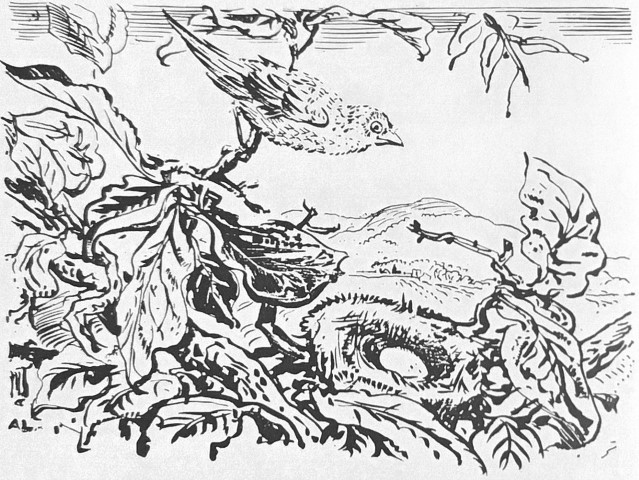
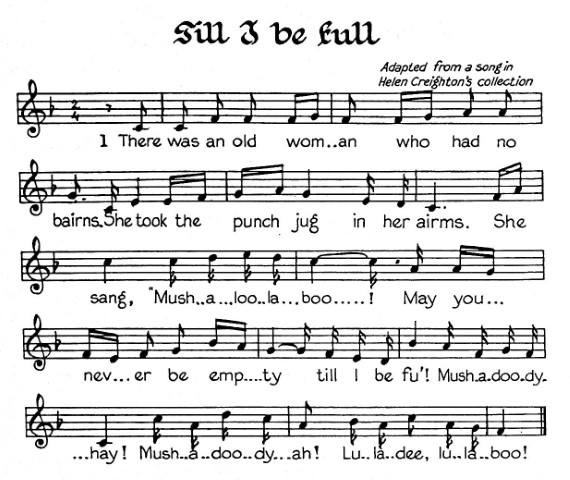
| 2 | She went to her cellar, filled up the jug; |
| Stood on a chair, to find her mug. |
| She sang: “Mush-a-loo-la-boo! |
| Who will join me in dancing a jig or two, |
| | Mush-a-doo-dy-ah!” (bis) . . . |
| | |
| 3 | “When I am dead and gone, gone to my rest, |
| Don’t place a stone upon my breast. |
| I’ll sing: Mush-a-loo-la-boo! |
| I’ll have a grave that is wide and very deep, |
| | And a jug of punch, (bis) |
| | At my head and my feet!” |
| 2 | Pray, can you plough it with one ram’s horn, . . . |
| And sow it all over with one pepper corn? . . . |
| |
| 3 | Pray, can you reap it with a sickle of leather . . . |
| And tie it all up with one peacock’s feather? . . . |
| |
| 4 | ——Now, you have asked me of these questions three . . . |
| It is my turn to ask three of thee . . . |
| |
| 5 | Pray, can you make me a fine cambric shirt . . . |
| Without any seam and all needle work? . . . |
| |
| 6 | Pray, in yon brook, can you wash it and wade . . . |
| Where water n’er flowed since earth it was made? |
| |
| 7 | Pray, can you dry it on yonder sweet thorn . . . |
| Where blossom n’er bloomed since Adam was born? . . . |
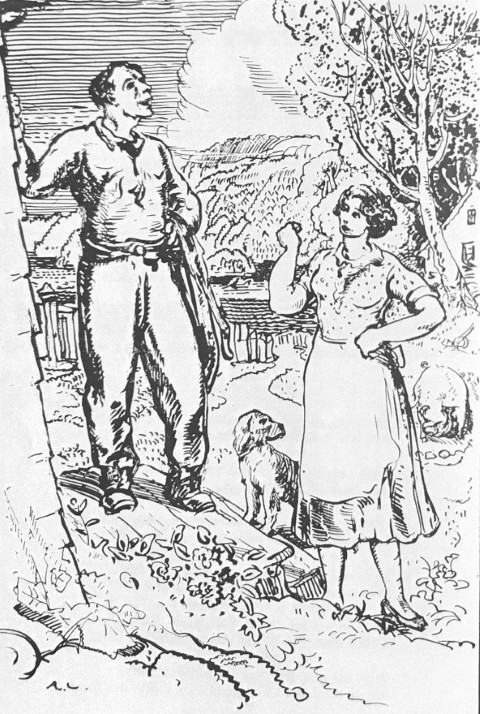
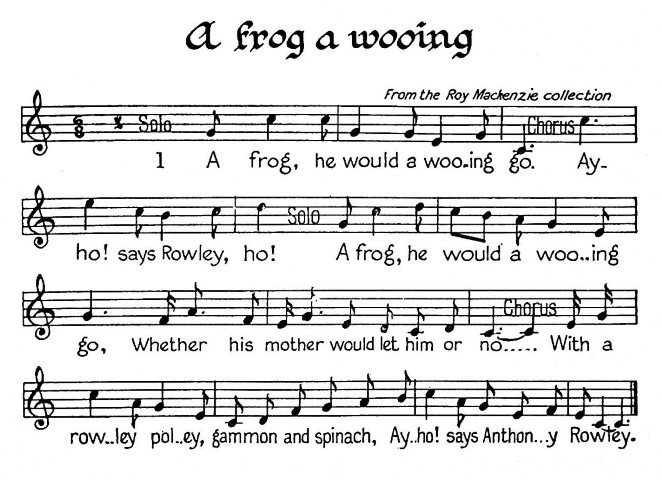
| 2 | So off he set with beaver hat . . . |
| Along the way he met Mister Rat . . . |
| |
| 3 | They soon arrived at Mousey Hall . . . |
| They gave a knock and gave a loud call . . . |
| |
| 4 | “Oh pray, Mrs. Mouse, are you within?” . . . |
| “Oh yes, kind sirs, I am sitting to spin” . . . |
| |
| 5 | “Oh pray, Mister Frog, give us a song! . . . |
| And let it be sweet and not very long” . . . |
| |
| 6 | “Excuse me, Pray!” says Mister Frog . . . |
| “I’ve got a bad cold I caught in a bog” . . . |
| |
| 7 | They were in glee, making a din . . . |
| A cat and her kittens came tumbling in . . . |
| |
| 8 | The cat, she pulled the rat adown . . . |
| Her kittens tore and scratched the Mousie’s gown . . . |
| |
| 9 | Now Mister Frog he shivered with fright . . . |
| Picked up his hat and bid him good-night . . . |
| |
| 10 | As stout Sir Frog, he crossed the brook . . . |
| A lively duck came and gobbled him up . . . |
| |
| 11 | This is the end of one, two, three . . . |
| The rat, the mouse and little froggie . . . |
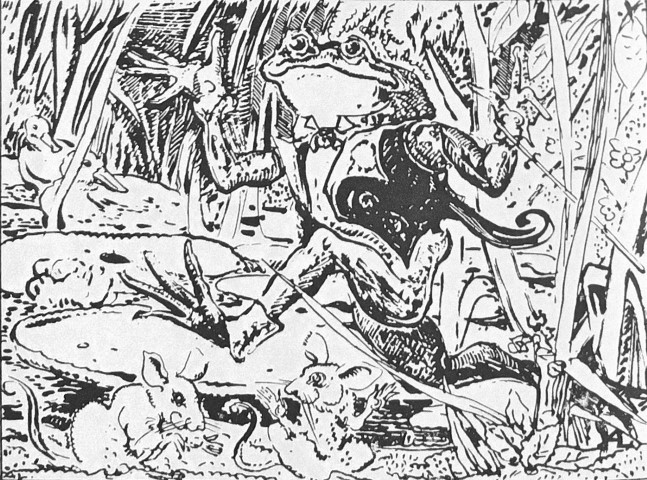
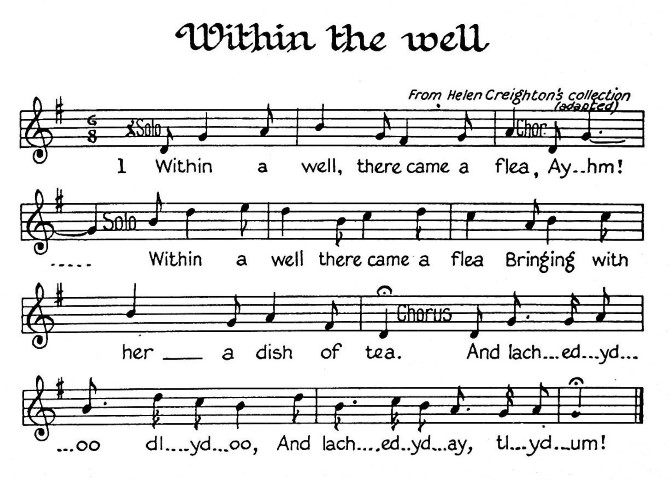
| 2 | Within the well there came a fly. (bis) |
| Ah hum! |
| She gulped so much, it made her die. |
| |
| 3 | Within the well there was a tick, (bis) |
| She ate so much, it made her sick. |
| |
| 4 | Within the well there was a frog. |
| She brought with her a jug of grog. |
| |
| 5 | Within the well there was a snail. |
| He had the bagpipes on his tail. |
| |
| 6 | Within the well there was a bee. |
| She played the fiddle on her knee. |
| |
| 7 | Within the well there was a girl. |
| Her pretty head was all acurl. |
| |
| 8 | Within the well came her sweetheart. |
| From her white arms he’d never part. |
| |
| 9 | Within the well there fell a bull. |
| It was so big the well was full. |
| |
| 10 | Within the well there dropped, alack, |
| The straw that broke the camel’s back. |
| |
| 11 | Within the well there fell a ram. |
| The occupants were in a jam. |
| |
| 12 | Within the well the waters rise, |
| And all float out with sputtering sighs. |
| |
| 13 | Within the well the water fell. |
| Good-night! There’s nothing more to tell. |
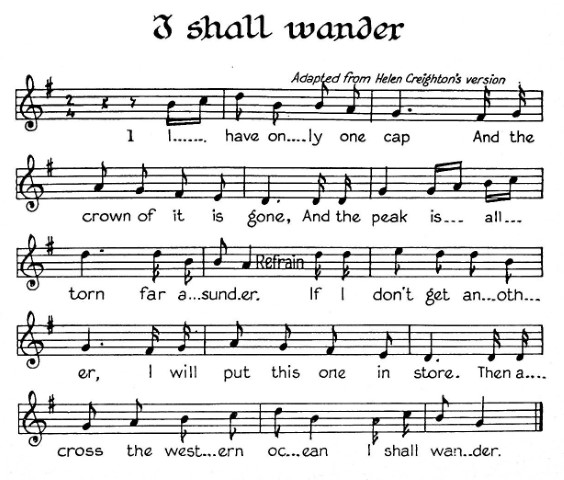
| 2 | Hey, hurrah for the grog, |
| For your jolly good grog, |
| For the Demerara |
| | And tobacca! |
| Oh, I have spent all my tin |
| On a lassie drinking gin, |
| And across the western ocean |
| | I shall wander. |
| | |
| 3 | I have only one shirt. |
| And the neck of it is gone, |
| And the back is all torn |
| | Far asunder. |
| If I don’t get another . . . |
| | |
| 4 | I have only one coat, |
| And the front of it is gone, |
| And the back is all torn |
| | Far asunder . . . |
| | |
| 5 | I’ve but one pair of shoes |
| And the heels are badly worn, |
| And the toes are all torn . . . |
| | |
| 6 | I’ve but one pair of pants |
| And the seat is patched and gone, |
| And the legs they are both torn . . . |
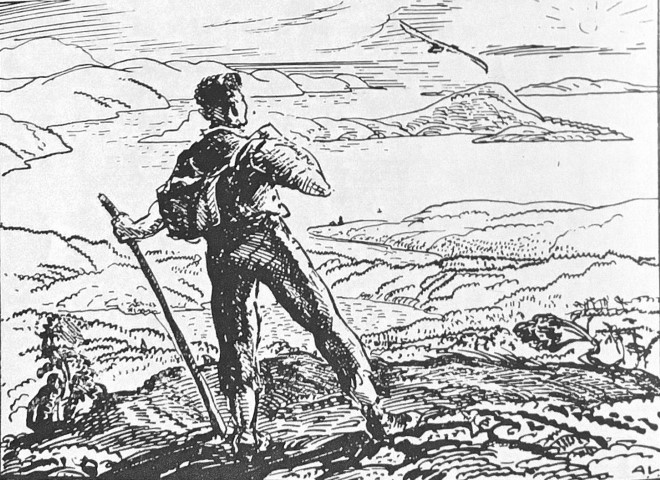
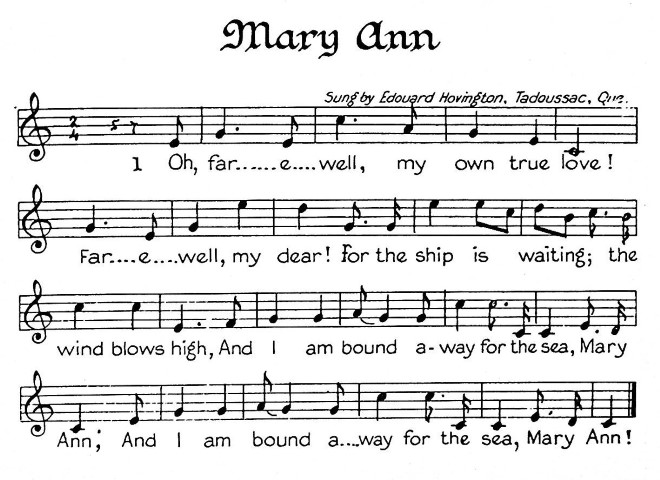
| 2 | Oh, yonder don’t you see the dove |
| | Sitting on the stile? |
| She’s mourning the loss of her own true love, |
| As I do now for you, my sweetheart, |
| | Mary Ann! (bis) |
| | |
| 3 | A lobster boiling in the pot, |
| | A blue fish in the brook, |
| They are suffering long, but it’s nothing like |
| The ache I bear for you, my sweetheart, |
| | Mary Ann! |
| | |
| 4 | Oh, had I but a flask of gin, |
| | Sugar here for two, |
| And a great big bowl for to mix it in, |
| I’d pour a drink for you, my sweetheart, |
| | Mary Ann! |
| 2 | He hailed me, the day before his sailing, |
| | “My love, this night, Oh, meet me! |
| Such a tale to you I will be telling, |
| | The tale of a man of the sea.” |
| | |
| 3 | A ship there is afar on the ocean, |
| | All plated with silver and gold. |
| Her captain was once my lover, Billy. |
| | His love for me now has grown cold. |
| | |
| 4 | If only I had the wings of an eagle, |
| | O’er the waves I would fly to his side. |
| I’d find my Billy and stoop down a diving. |
| | In his arms I’d forever abide. |
| 2 | My girl is like a little bird |
| | | A little bird, |
| | It flies from tree to tree, |
| And when it lands on a branch so high, |
| | So near the sky, |
| And flies far away and is free . . . |
| | | |
| 3 | I wish I were a bird like her, |
| | | A bird like her, |
| | Flying from tree to tree. |
| I would follow her by day and by night, |
| | By day, by night. |
| From her I would never flee. |
| 2 | I called to him, but he did not hear. |
| | Not e’en a look gave he. |
| Rode he far from his own Ellen dear, |
| | On the road towards the sea. |
| | |
| 3 | I passed the gate, and I called and cried, |
| | As he rode to the sea. |
| And I knew he would not turn again. |
| | He will ne’er come back to me. |
| | |
| 4 | Last night, we quarrelled and spoke in haste, |
| | And bitter words had we. |
| And so I am sad for fear my love |
| | He will not come back to me. |
| | |
| 5 | I sit alone and I long for him, |
| | The tender words he said. |
| I shall mourn him ’til this world shall end, |
| | And my lonely heart is dead. |
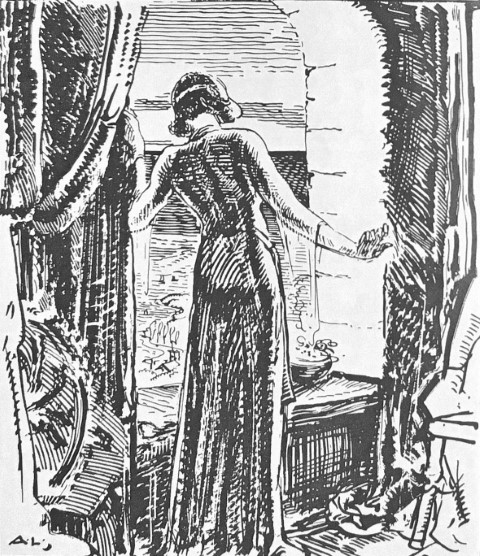
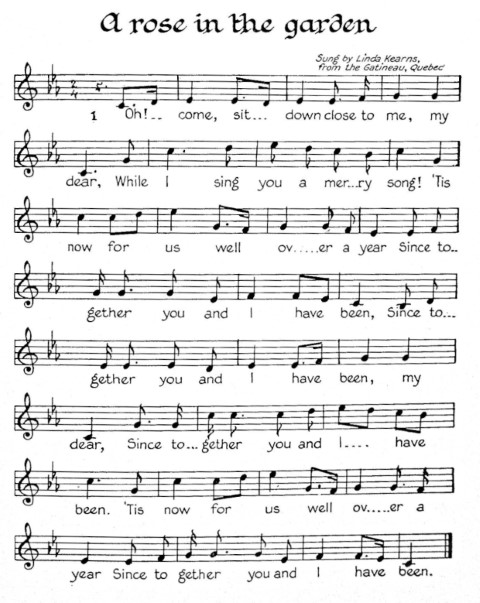
| 2 | I will not sit close to you, my dear, |
| | Now nor at any other time. |
| You’ve given your love to another one, |
| | And your heart is no longer mine. |
| Your heart no longer is mine, my dear, |
| | Your heart no longer is mine. |
| You’ve given your love to another one, |
| | And your heart no longer is mine. |
| | |
| 3 | When your heart truly was mine, my dear, |
| | You laid your head upon my breast, |
| And I listened to the strange oaths you swore |
| | That the sun, it rose in the west, |
| That the sun, it rose in the west, my dear, |
| | That the sun, it rose in the west, |
| And I listened to the strange oaths you swore |
| | That the sun, it rose in the west. |
| | |
| 4 | There’s a rose in the garden for you, my dear, |
| | A rose in the garden for you. |
| When fish fly high like the birds in the sky, |
| | Young men will then prove true, |
| Young men will then prove true, my dear, |
| | Young men will then prove true, |
| When fish fly high like the birds in the sky, |
| | Young men will then prove true. |
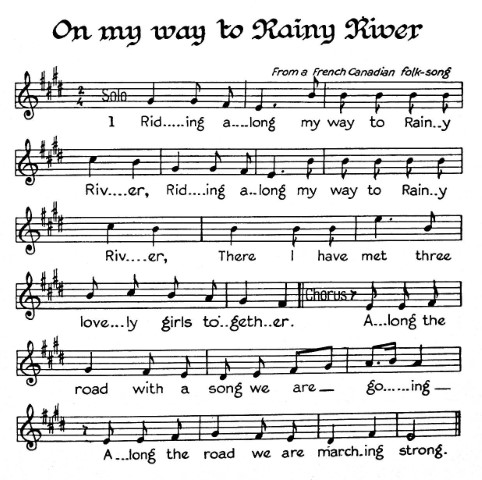
| 2 | There I have met three lovely girls together. (bis) |
| I didn’t chose, mine was fair Arabella. |
| |
| 3 | There I placed her behind me on the saddle. |
| |
| 4 | A hundred leagues I held her fast a riding. |
| |
| 5 | She wouldn’t speak, nor with me be abiding. |
| |
| 6 | Then she said, “Stop! Oh, let me go a drinking!” |
| |
| 7 | I brought the belle to the edge of the river. |
| |
| 8 | All she would do was turn away and shiver. |
| |
| 9 | Then I took her to the home of her father. |
| |
| 10 | She drank a lot, it was not any bother. |
| |
| 11 | Her parent’s health first she would be a toasting. |
| |
| 12 | Brothers, sisters, of them she was a boasting, |
| |
| 13 | Of me the lad, who’d brought her home so safely. |
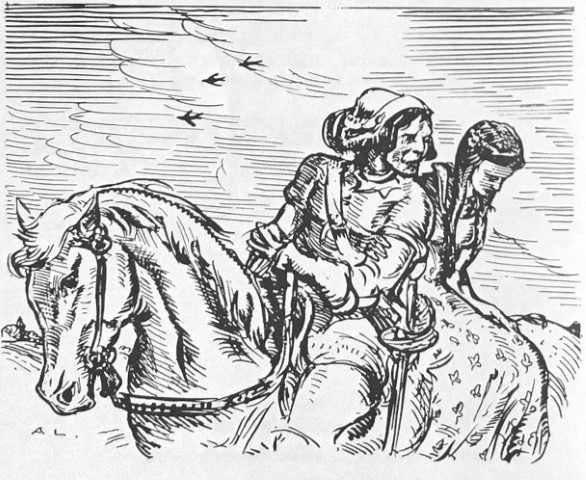
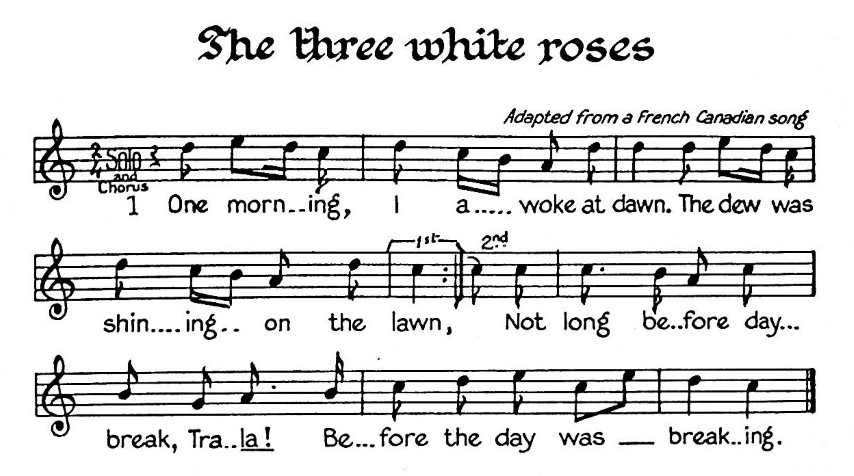
| 2 | Down the garden path I went; |
| To gather roses I was bent, |
| To gather roses white, |
| | Tra la! |
| To gather three white roses. |
| | |
| 3 | Holding the roses in my hand, |
| I saw my love before me stand, |
| My love before me stand, |
| | Tra la! |
| My love before me standing. |
| | |
| 4 | Lovely she was in the morning light! |
| She asked me for the roses white, |
| She asked me for a rose, |
| | Tra la! |
| She asked for my three roses. |
| | |
| 5 | I gave three to her with a bow. |
| She tripped on one I know not how, |
| She tripped on one somehow, |
| | Tra la! |
| She tripped on all three roses. |
| | |
| 6 | Oh, mercy me! adown she fell. |
| She broke her leg, her knee as well, |
| She broke her pretty leg, |
| | Tra la! |
| Her knee she broke a falling. |
| | |
| 7 | Oh, bring to me a doctor, dear! |
| That I shall swoon I greatly fear, |
| I fear that I shall swoon, |
| | Tra la! |
| I fear I may be swooning. |
| | |
| 8 | O doctor dear, of you I beg |
| Whatever’s happened to my leg? |
| What’s happened to my leg, |
| | Tra la! |
| Oh, tell me what’s the matter! |
| | |
| 9 | The way to mend it I will tell: |
| Dew drops shall weave a magic spell, |
| In dew drops bathe it well, |
| | Tra la! |
| In dew drops go a bathing. |
| | |
| 10 | Within a shining golden bowl, |
| Oh, that alone will make it whole, |
| With roses white adorn’d, |
| | Tra la! |
| Three roses white adorning. |
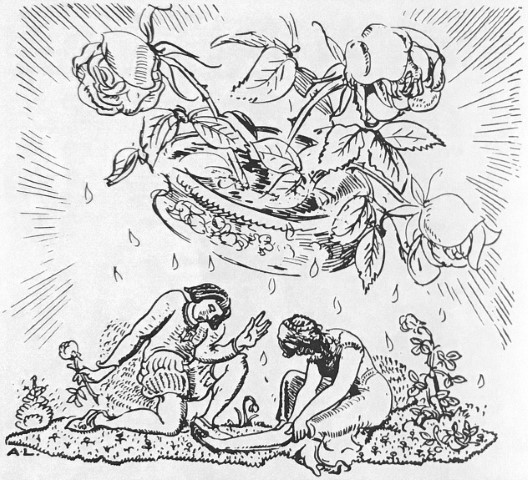
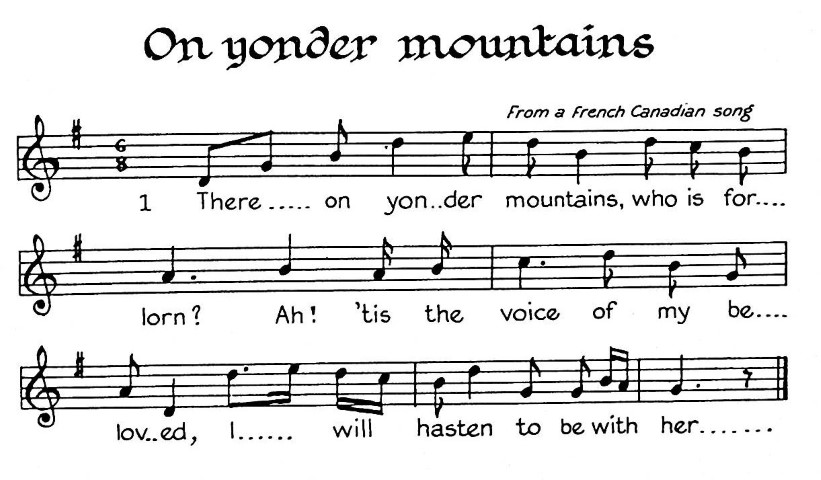
| 2 | What troubles you, sweetheart? why weep so long? (bis) |
| If I weep, ’tis for my love. |
| Within your arms I long to be. |
| |
| 3 | Our love so deep, sweetheart, let us enjoy! |
| Oh, make haste, the years go by! |
| The days of youth are all too short. |
| |
| 4 | The sheep in the meadows fear not the wolf. |
| Why should you, O my sweetheart, |
| Fly from me at love’s first call? |
| 2 | Three lovely ducks . . . |
| The king’s son would a hunting go. |
| |
| 3 | He sees the ducks swim to and fro. |
| |
| 4 | He takes his gun all silver bright. |
| |
| 5 | He shoots the black and kills the white. |
| |
| 6 | How cruel you are, alas, king’s son. |
| |
| 7 | To kill my duck, the brightest one! |
| |
| 8 | Two diamonds from his eyelids spill, |
| |
| 9 | With gold and silver from his bill. |
| |
| 10 | The feathers on the wind are borne, |
| |
| 11 | Three girls are gath’ring them forlorn, |
| |
| 12 | To make with them soft feather beds, |
| |
| 13 | Where they may rest their lovely heads. |
| 2 | Green are all its branches, |
| | O my heart, be still, be still! |
| Green are all its branches, |
| And the ripe fruit is sweet, (bis) |
| | | So sweet, |
| And the ripe fruit is sweet. (bis) |
| 3 | Beneath, are three princesses, are lying fast asleep . . . |
| Asleep . . . |
| |
| 4 | The eldest awakens, “My sister, tis the dawn.” |
| |
| 5 | The youngest arises, “ ’Tis nothing but moonlight. |
| |
| 6 | Shining on my lover, and it is shining bright. |
| |
| 7 | To the war he’s going, where for me he will fight. |
| |
| 8 | If he is victorious, my love to him I’ll plight. |
| |
| 9 | If he is defeated, he’s still my gallant knight, |
| My knight . . .” |
TRANSCRIBER NOTES
Mis-spelled words and printer errors have been corrected. Where multiple spellings occur, majority use has been employed.
Punctuation has been maintained except where obvious printer errors occur.
The txt version has been omitted from this eBook project.
[The end of Come a Singing! by Marius Barbeau and Arthur Bourinot]



